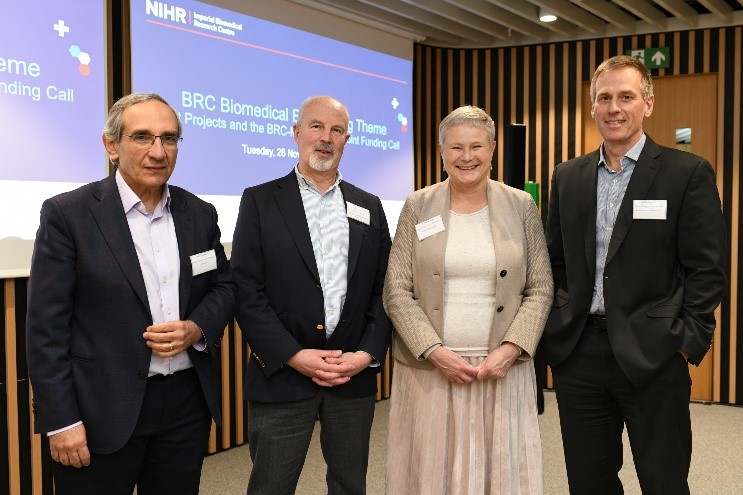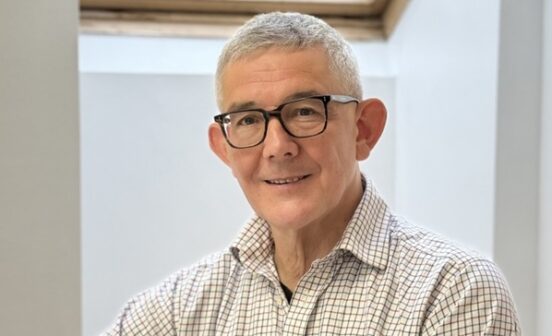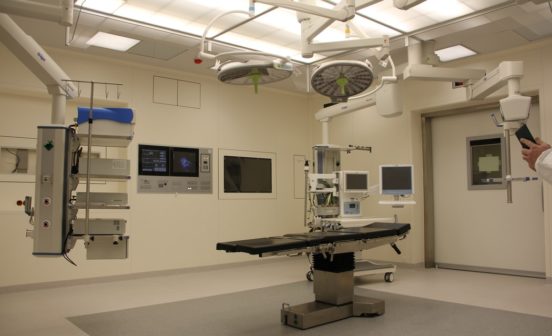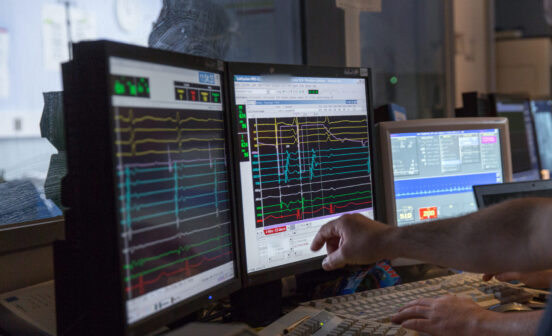Event NIHR Imperial BRC Theme Biomedical Engineering launched a new era of collaboration bringing engineered technologies to the clinic

Academic clinicians, engineers and research partners gathered to celebrate the official integration of the Biomedical Engineering Theme within the National Institute for Health and Care Research (NIHR) Imperial Biomedical Research Centre (BRC). This new Imperial BRC Theme sets an example for medical technology translation into the clinic for the first time.
Professor Deborah Ashby, Interim Dean of the Faculty of Medicine, Chair in Medical Statistics and Clinical trials, said in her opening remarks: “Bringing the Biomedical Engineering theme into the BRC community in our White City Campus will be a significant step in providing a comprehensive, integrated platform to create more impacts on health technology. Given the general perception that engineering and medicine are often regarded as distinct disciplines, collaboration between these two fields poses a challenge. Yet, from my perspective, engineering is positioned to lead the way in offering practical solutions for clinical needs, and this groundbreaking collaboration will expedite the incorporation of an engineered mindset into clinical practices.”
Professor Mark Thursz, NIHR Imperial BRC Director and Professor of Hepatology, Professor of hepatology, Head of Department of Metabolism, Digestion and Reproduction, highlighted: “The BRC focuses on 14 themes to address the most pressing health needs in north-west London. These themes are connected by four crucial threads within the BRC: Early Diagnosis, Precision Medicine, Digital Health and Convergence Science. Our focus encompasses both responding to patient-led demand for technology (technology-pull) and identifying available technologies to meet patient needs (technology-push). An unprecedented milestone in BRC history unfolds as the Biomedical Engineering theme becomes seamlessly integrated. This new chapter is set to be powered by the collaborative forces of the Faculty of Engineering, the Faculty of Natural Sciences, and the Imperial College Business School. Their combined efforts aim to propel existing technologies forward, offering novel solutions not only to the Faculty of Medicine but also to the broader NHS service.”
Professor George Hanna, Biomedical Engineering Co-Theme Lead and Clinical Lead and Head of the Department of Surgery and Cancer, Director of the NIHR London In-Vitro Diagnostics Co-operative, said: “The BRC is equipped with a robust research infrastructure that plays a pivotal role, including clinical trial capacity, advanced data analysis, and training. Our strategy involves fostering collaborative projects through a range of funding schemes, injecting renewed vitality into the existing BRC infrastructure. This includes the addition of state-of-the-art laboratory facilities and partnerships with MedTechONE, the forefront health tech programme at the College. Expanding our influence, we will actively engage with other 13 themes and the NIHR-funded Health Research Centre. The establishment of BRC-funded resources is underway, covering both clinical and non-clinical researchers, along with the implementation of streamlined infrastructure access systems”.
In his talk, Professor Anthony Bull, Biomedical Engineering Theme Lead and Engineering Lead and Professor of Musculoskeletal Mechanics, Director of the Musculoskeletal Medical Engineering Centre and the Centre for Blast Injury Studies, highlighted the merit of incorporating the MedTech@IC College strategy within the theme. MedTech@IC is the College’s overarching coordinating and support initiative encompassing medtech translation both clinically and commercially, leveraging Imperial’s extensive intellectual property portfolio in this field.
Professor Bull announced the launch of the BRC-MedTechONE joint funding call, set to go live on 6 December 2023. This initiative, jointly funded by the NIHR BRC Biomedical Engineering Theme and the Wellcome Trust-funded MedTechONE initiative, makes £400k available for up to four cross-disciplinary translational projects lasting 12 months. Research topics span a wide range of areas, including medical sensing and imaging, medical devices, precision therapy, smart biomaterials, minimally invasive interventions and robotics, as well as diagnostics.





